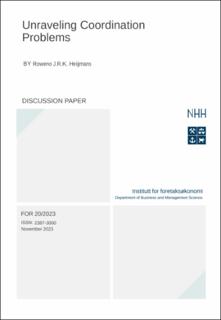| dc.contributor.author | Heijmans, Roweno J.R.K. | |
| dc.date.accessioned | 2023-11-09T09:13:00Z | |
| dc.date.available | 2023-11-09T09:13:00Z | |
| dc.date.issued | 2023-11-09 | |
| dc.identifier.issn | 2387-3000 | |
| dc.identifier.uri | https://hdl.handle.net/11250/3101569 | |
| dc.description.abstract | The interplay between strategic beliefs and policy complicates policy design in coordination games. To untangle this relationship, we study policy design in the context of equilibrium selection. We characterize the unique subsidy scheme that selects a targeted strategy vector as the unique equilibrium of a coordination game. These subsidies are continuous in model parameters and do not make the targeted strategies strictly dominant. While discrimination is optimal in games with multiple equilibria (Segal, 2003; Winter, 2004), we construct a non-discriminatory subsidy scheme the cost of which converges to that of a least-cost discriminatory policy when agents are symmetric. | en_US |
| dc.language.iso | eng | en_US |
| dc.publisher | FOR | en_US |
| dc.relation.ispartofseries | Discussion paper;20/23 | |
| dc.subject | Coordination | en_US |
| dc.subject | global games | en_US |
| dc.subject | contracting with externalities | en_US |
| dc.subject | incentives in teams | en_US |
| dc.subject | networks | en_US |
| dc.subject | unique implementation | en_US |
| dc.title | Unraveling Coordination Problems | en_US |
| dc.type | Working paper | en_US |
| dc.source.pagenumber | 35 | en_US |
